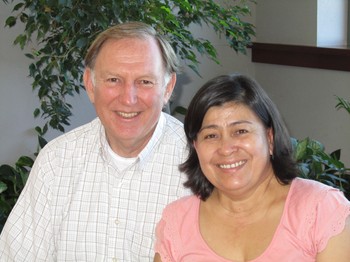Fifteen international peacemakers from different countries around the world are visiting congregations, presbyteries and colleges of the Presbyterian Church (U.S.A.) from Sept. 21-Oct. 15.
They are sharing their stories about church-based ministries in their countries that seek peace, justice and pursue peace in the name of Jesus Christ. This year’s international peacemakers come from Colombia, Honduras, Indonesia, Jordan, Lebanon, Madagascar, Northern Ireland, Palestine, the Philippines, Russia and Syria.
The International Peacemaker program is sponsored by the Presbyterian Peacemaking Program.
Tim and Gloria Wheeler are mission co-workers in Honduras, Gloria’s native country. Gloria and Tim have been married since 1978 and have served as mission co-workers since 1990. They serve in partnership with Heifer International and the Presbyterian Church of Honduras, coordinating mission teams from the United States. In addition, Tim is an advisor to Heifer and Gloria works with local groups on issues concerning women and indigenous people.
The Wheelers will be visiting the Presbyteries of Long Island, Grand Canyon, Detroit and New Castle
What is the situation in your country that you will be addressing?
Tim: “We will be talking about the difficult situation in the country and the struggles and challenges that people have. The country is very divided and polarized. There is a lot of violence. Economically people are in a difficult situation.”
Gloria: “There was coup three years ago and the president was put out of the country and that created a lot of division. Some people say it was a coup and some say it was a succession of power that was legal. It has created problems, even within families.”
How are the faith communities addressing this situation?
Tim: “Faith communities are affected by the division. One way they are dealing with it is by not dealing with it, but some in faith communities they are trying to deal with it and become a more prophetic voice trying to bring about reconciliation.”
Gloria: “There are some people very active in trying to work on a small basis and trying to talk with each other, even though there may be differences between the way that they think and the way that they feel. They’re still sister and brothers. That’s in the small rural communities, but in the city it’s a different situation. It is very polarized. You are on one side or another.”
What lessons from your situation are you trying to communicate to U.S. Presbyterians?
Gloria: “The policies of the United States and the way people think and act here affect us. We are close by.”
Tim: “The hopes and dreams of the people there are the same as in the United States. They want their children to have a better life, more education and good health. It’s not that different.”
What is the primary message you want to communicate to U.S. Presbyterians?
Tim: “Do not forget about what’s going on in Central America, the needs for relationships and partnerships. The need to be in mission and be in contact with people is very important. We are trying to get more churches and people involved in support of the Presbyterian Church in Honduras and also the program with the Heifer Project that we work with.”
Gloria: “It’s always the perfect time for churches and congregations to make the decision when, how and where they want to be in mission, but it’s important to make the decision.”
Tim: “It can be right here in your backyard, building community in your own town, and it can be in conjunction with people in other countries.”
Pat Cole is a communications specialist for the Presbyterian Mission Agency (formerly the General Assembly Mission Council) and an occasional contributor to Presbyterian News Service.

